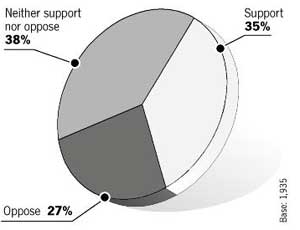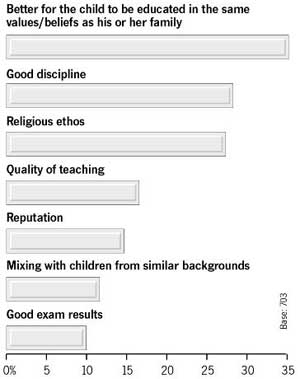Voters Oppose Expansion Of Faith Schools
Nearly twice as many people oppose the Government's plan to expand faith schooling as support it, a MORI poll conducted exclusively for The TES reveals. More than two in five people are against increasing the number of state-funded religious schools, the survey of nearly 2,000 people found.
Only a quarter of the adults interviewed throughout Great Britain earlier this month favour expansion. Just 5 per cent strongly supported the plan. They were asked whether they supported the expansion of religious schools, including ones run by Muslims, Sikhs and the Greek Orthodox church.
Ministers have already been warned by teachers' leaders, Labour activists and backbench MPs that plans to increase the number of faith schools will damage race relations and create dangerous divisions.
Ashok Kumar, MP for the largely-white Middlesborough South and East Cleveland constituency, said: "This is a road to segregation. Ghettos will emerge."
While the poll's findings may come as a blow to the Government, it does show strong support for education ministers' desire that faith schools should be "inclusive".
Four out of five adults felt that religious schools should be made to offer places to pupils of other faiths or those without a faith. Only one in five thought they should be allowed to admit only pupils who supported their own religion.
The poll shows that most adults are either supportive or indifferent to the 7,000 existing religious state schools, which are nearly all Christian and cater for 1.7 million pupils.
The people most likely to support them - women, older people, the more affluent and Conservative voters - are the very ones most inclined to oppose their expansion.
The poll reveals that good discipline ranks as highly as religious ethos among the reasons people support religious state schools. Only 10 per cent consider "good results" a reason for supporting them, although academic excellence is one reason for government support for expansion.
One in four of the top-performing schools is religious although they constitute only one in seven of the 3,500 state secondary schools. Last week's list of the 20 schools adding greatest value at GCSE included three Catholic and two Muslim schools. But some also feature at the bottom end of the league tables.
Among those who opposed faith schools, the main reasons were the belief that religion should not be part of education (34 per cent) and that faith schools can increase divisions in a community (29 per cent).
Church of England policy is for all its schools to be inclusive. Canon John Hall, director of its board of education, said the "overwhelming majority" of Anglican primaries took in children of other faiths or those without faith. "Where they have policies that in practice exclude other pupils, they are looking at it again. We have sent people to meet them," he said.
Some Roman Catholic schools take children from other faiths. But Oona Stannard, director of the Catholic Education Service, said: "We see no need to oblige new faith schools to take a certain percentage of pupils of other faiths."
"If this is the wish of the local community, relevant partners and promoters, then we respect their wishes," she added.
Yusuf Islam, chair of the Islamia Schools Trust which runs three Muslim schools in London, said: "On the face of it, faith schools could appear to be divisive, but so could secular schools. Secular schools could equally indoctrinate children into believing that all religious-minded people are out of order. That breeds a kind of intolerance in itself."
"Those reports from the riots in Oldham insinuated that Muslim schools were responsible. But they are not Muslim schools. They are state schools that Muslims go to and probably have no structured Islamic programme. That is probably why kids in those areas took part in those demonstrations. You wouldn't find our boys doing that."
Education Secretary Estelle Morris said: "It is wrong to land on the head of faith schools all of society's concerns about segregated communities."
"Faith schools have existed for centuries and it would be wrong to deny a faith-based education to parents of minority faiths."
Full survey results and Have your say, www.tes.co.uk
TES/MORI poll findings:
- Nearly twice as many (43%) oppose the expansion of state-funded religious schools as support it (25%). The rest (29%) neither support nor oppose expansion
- More than a third (35%) support existing state-funded religious schools; more than a quarter (27%) oppose them and the rest (38%) neither support nor oppose them
- Four out of five (81%) think state-funded religious schools should have to admit pupils of other faiths and pupils who are not religious at all
- Main reasons given by supporters of religious schools are: a desire for children to be educated in the same values and beliefs as their family (35%); good discipline (28%); religious ethos (27%). Only 10% cited good exam results
- The main reasons given for opposing religious schools are the belief that religion should not be part of education (34%) and that they increase community divisions (29%)
Do you support or oppose state schools which are run by religious groups such as the Church of England or the Roman Catholic Church?

Do you support or oppose the Government's plan to allow more state funded religious schools such as Muslim, Sikh and Greek Orthodox?

What are your main reasons for supporting church/religious schools?

What are your main reasons for opposing church/religious schools?

Technical details
MORI interviewed a representative quota sample of 1,935 adults aged 15 plus between 8-13 November 2001. All interviews were face-to-face and were conducted across 194 sampling points throughout Great Britain. All data are weighted to the known national population profile.



